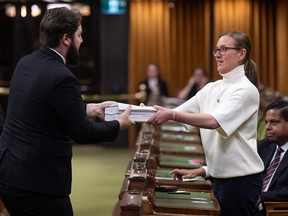Canada’s deficit is now forecast to be $62 billion, more than fifty per cent higher than projected

OTTAWA — It’s not easy to make a $62-billion deficit seem like a minor story, but the Liberal government found a way.
Minutes before the government’s red ink-soaked fiscal update was to be unveiled to journalists on Monday morning, Finance Minister Chrystia Freeland announced her resignation and dramatically exposed the internal strife in the government.
As Ottawa struggled with the political implications of Prime Minister Justin Trudeau’s top minister dropping her resignation in his lap, officials in the Finance Department struggled with a more basic question: what happens now?
The finance minister is responsible for the fall economic statement and as journalists convened to see the updated books, the country appeared to have no finance minister. Freeland was scheduled to speak at a press conference in the afternoon and table her department’s fiscal document in the House of Commons at 4 p.m. ET but, now, there was no one to do it.
Hours passed and the budget documents remained under a black tablecloth while finance officials and journalists waited on news about whether the briefing would go ahead.
A few kilometres away, on Parliament Hill, Liberal ministers digested the news of their colleague’s resignation at a cabinet meeting. Some, like Transport Minister and Treasury Board President Anita Anand, expressed personal regret at losing a friend and colleague from cabinet, while others said the work of government would go on.
Eventually, after nearly four hours of limbo, the fall economic statement was delivered to reporters with figures that, on a normal day, would have generated a week’s worth of headlines.
Canada’s deficit is now forecast to be $62 billion, more than 50 per cent higher than the $40-billion projection contained in Freeland’s spring budget. The economy is slumping, causing growth predictions to tick down and government revenues to be revised down by $5.5 billion less than projected in April.
The government plans to spend $1.3 billion over six years on a “comprehensive border security package,” an initiative driven almost entirely by U.S. President-elect Donald Trump’s threat to unleash 25 per cent tariffs on Canada if it doesn’t beef up border security.
In her resignation letter posted Monday morning on the social media site X, Freeland described a disagreement with Trudeau about the fiscal direction of the country as it tried to confront the threats from Trump. Freeland said she had argued for “eschewing costly political gimmicks” in the face of serious economic threats from the United States.
The government also booked nearly $5 billion for COVID-19 related expenses, such as $1.2 billion for expired vaccines and other treatments and $3.5 billion for writing off loans made to workers and businesses during the pandemic.
With multiple calls for Trudeau’s resignation, even from his own MPs, the political drama surpassed the fiscal news on Monday. And, at 4 p.m., when the fiscal document was supposed to be tabled in the House, the government still didn’t have a finance minister to shepherd it through the House of Commons, with Liberal House leader Karina Gould putting the document before MPs.
As Gould tabled the economic statement, Public Safety Minister Dominic LeBlanc was rushed to Rideau Hall to be sworn in as the new finance minister, solving at least one of the government’s many problems.
National Post
Our website is the place for the latest breaking news, exclusive scoops, longreads and provocative commentary. Please bookmark nationalpost.com and sign up for our daily newsletter, Posted, here.